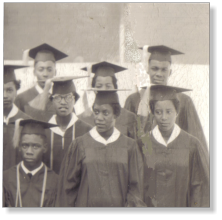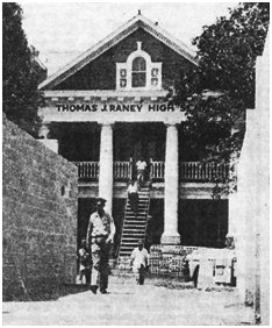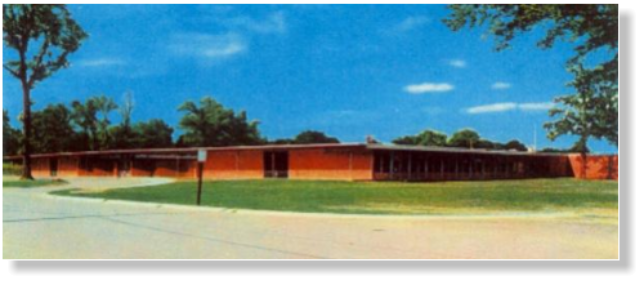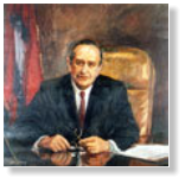
HORACE MANN HIGH SCHOOL
The story behind Little Rock’s first “Negro” high school

The history of Little Rock’s
first High School for
African Americans




Built in 1955, this school was named for Horace Mann
(1796-1859), the U.S. Congressman and education
reformer widely known as the "Father of American
Education." Mann High School was first occupied on April
9, 1956. It was built as the new high school for African-
American students, moving them out of Dunbar Junior-
Senior High School, which then became solely a junior
high school. Mann had 37 classrooms, a gymnasium and a
cafeteria, and the cost of construction was about
$926,000. Mann was recognized for its design by the
American Institute of Architects.
Horace Mann was born in Franklin, Massachusetts, in
1796. He had little formal schooling but read extensively
at the Franklin Town Library where he learned enough to
be admitted to Brown University in 1816.
T.J. Raney High School was formed in the autumn of
1958. It was named after Thomas J. Raney, a prominent Little Rock businessman.
Governor Orval Faubus enacted a law that enabled him to close all four of Little Rock's public high schools when the LRSD
School Board decided to proceed with the integration of its schools after the Brown v. Board of Education ruling. The
1958-59 school year is referred to by many as the "Lost Year" because the high schools were closed.
The Little Rock Private School Corporation was formed in September 1958, aided by Governor Faubus, with the intent to
open private schools for white students in the empty high school buildings when they were shut down. The School Board
went as far as to actually lease the then-vacant buildings to the corporation, but the Supreme Court stopped the action,
saying that "evasive schemes for segregation" could not be used to nullify court orders.
The Little Rock School District made an effort to fulfill its dedication to educate the high school students of Little Rock and briefly entered
into agreements with the three local television stations to broadcast teacher-led lessons in the mornings for the displaced high school
students (KATV, the ABC affiliate, broadcast classes for sophomores; KTHV, the CBS affiliate, showed courses for juniors; and KARK, the NBC
affiliate, broadcast courses for seniors). Only the basic courses -- math, science, English and history -- were offered, but it was better than
nothing at all.
The Little Rock Private School Corporation leased a building formerly used by the University of Arkansas Graduate Center at Little Rock at
16th and Lewis streets. About 750 students attended Thomas J. Raney High School, which officially opened for business on 22 October 1958.
(The TJ Raney High School building no longer stands.)
Obviously, not all of Little Rock's public high school students attended Raney High School.
Two smaller private schools, Baptist High and Trinity Interim Academy, also were formed.
In all, 3,665 students were affected by the closure of the high schools. Of 2,915 white
students, 1,120 enrolled in private schools in Little Rock and nearby Conway, 877 were in
other schools in Arkansas, 275 were in out-of-state schools and 643 did not go to school. Of
the 750 African-American students, 229 were in other public schools in Arkansas, 79 were
attending out-of-state schools and 442 were not in school.
One hundred eighty-eight students graduated from T.J. Raney High School at the end of the
1958-59 school year. Governor Faubus spoke at the school's commencement ceremony.
Although it was termed "private," students were not charged tuition to attend. The school
relied on government funds (money that the Little Rock School District lost when its high
schools were closed) as well as contributions from businesses and private citizens for its
operating costs.
Raney High Schooll was only in operation for the 1958-59 school year. The Little Rock
School District reopened its high schools (with its plan for integration intact) the following
year, and The Little Rock Private School Corporation announced that it was out of money.

Sources:
LRSD archives.
Arkansas Gazette, August 5, 1959, several stories related to Central High School and T.J. Raney High School.
"Little Rock 1957: Pages from History," Arkansas Democrat-Gazette's Arkansas Online website:
http://www.ardemgaz.com/prev/central/index.html
"1958-1959: The Lost Year Project" website: http://www.thelostyear.com/index.html
Central High School 40th Anniversary website: http://www.centralhigh57.org/







Copyright © 2023 NATIONAL DUNBAR HORACE MANN ALUMNI ASSOCIATION. All Rights Reserved.









